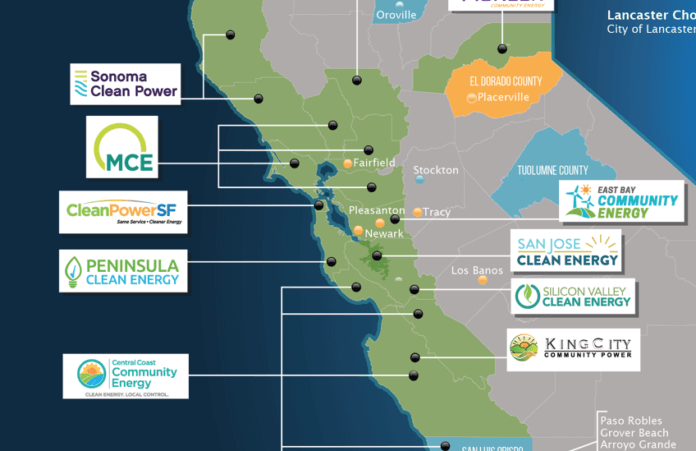Northern and central coast community choice aggregators (CCAs) have formed a new Joint Powers Authority (JPA) – California Community Power. The JPA allows the CCAs to combine their buying power to procure new, cost-effective clean energy and reliability resources to continue advancing local and state climate goals.
The CCAs forming California Community Power represent 2.6 million customer accounts and 6.6 million people across more than 140 municipalities spanning from Humboldt County to Santa Barbara County. The CCAs serve a combined annual load of 32,600 GWh, which represents about 40% of PG&E’s annual electric load. The member CCAs include: Central Coast Community Energy, East Bay Community Energy, MCE, Peninsula Clean Energy, Redwood Coast Energy Authority, San José Clean Energy, Silicon Valley Clean Energy and Sonoma Clean Power. CleanPowerSF is pursuing membership.
“Over the years, as the CCA movement has grown, there has been an increase of CCA joint procurement efforts for large-scale renewables and energy storage projects,” says Beth Vaughan, executive director of the California Community Choice Association (CalCCA). “The creation of California Community Power represents a truly community-led approach to advancing cleaner energy, greater reliability, and reduced costs for ratepayers.”
Additional benefits of the new JPA include enhanced negotiating power, larger renewable and storage project procurement, shared risk mitigation and increased opportunities for innovation, as demonstrated by the first, major joint procurement for 500 MW of long-duration energy storage. The long-duration request for offers seeks a minimum 10-year contract for grid-charged technologies to come online by or before 2026 with a discharge period of at least eight hours. The solicitation is currently in the project evaluation stage.
Under the JPA structure, individual members are not obligated to participate in every procurement or joint project. Each CCA will be represented by their CEO or other designee on the board of directors, which will operate as a public entity with open and transparent meetings compliant with the Brown Act. The JPA structure safeguards members from additional liabilities so there is no added risk for the members. Each CCA maintains its community-driven, local autonomy to meet the needs of their customers and region.
More information will be available on the California Community Power website, which is currently under development.




